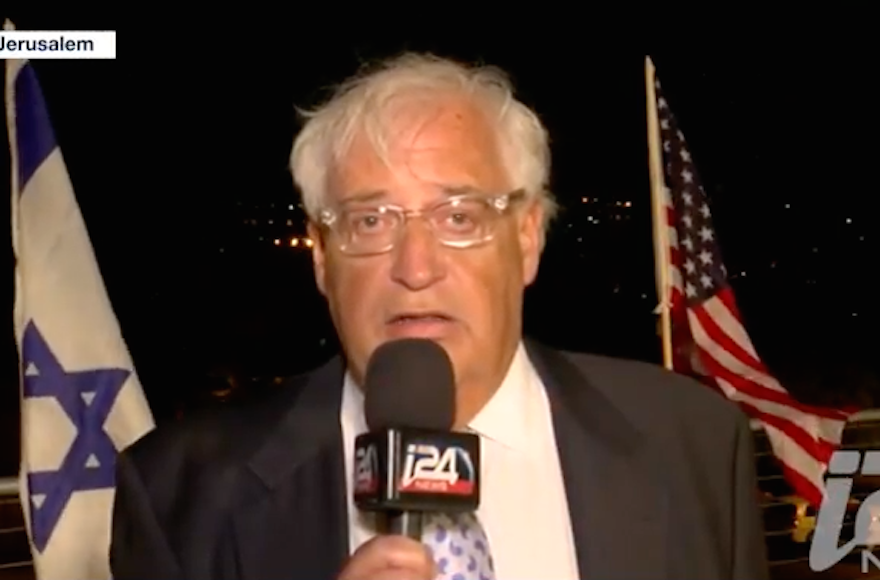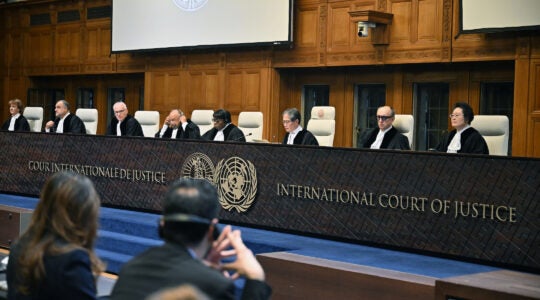WASHINGTON (JTA) — Dovish Jewish groups said they would work hard to keep the Senate from confirming Donald Trump’s nomination of David Friedman as U.S. ambassador to Israel, but their more hawkish counterparts celebrated the choice as momentous.
Friedman, a bankruptcy lawyer has for years has represented the Republican president-elect and his real estate development business, supports and has funded construction in settlements and suggests it is time to think of alternatives to the two-state solution. He has accused President Barack Obama of anti-Semitism and urged Israel to demand loyalty oaths from its Arab citizens.
Prime Minister Benjamin Netanyahu had not weighed in on the pick, but his deputy foreign minister, Tzipi Hotovely, said she was pleased with the nomination and named Friedman’s pro-settlements posture as a reason. Friedman is president of American Friends of Beit El Institutions, which raises money for a West Bank settlement that has frequently clashed with Israeli security forces and supports a program meant to teach North American college students to “delegitimize the notion of a ‘two-state solution.’”
“The expressed intention to appoint Friedman is very welcome news for Israel,” Hotovely said. “His positions reflect the desire to strengthen the standing of Israel’s capital Jerusalem at this time and to underscore that the settlements have never been the true problem in the area.”
Dani Dayan, the Israeli ambassador to the United Nations and himself a former settler leader, posted on Twitter a photo of himself and Friedman, and congratulated the nominee.
In a Twitter message Thursday about the announcement, Jeremy Ben-Ami, the president of the left-leaning J Street group, wrote: “Trump’s pick of Friedman for Israel Amb[assador] is anathema to values that underlie [the] U.S.-Israel relationship. We’ll fight this with all we’ve got.”
In a formal statement, J Street said it would “vehemently” oppose Friedman’s confirmation in the Senate and called his nomination “reckless.”
“As someone who has been a leading American friend of the settlement movement, who lacks any diplomatic or policy credentials and who has attacked liberal Jews who support two states as ‘worse than kapos,’ Friedman should be beyond the pale for senators considering who should represent the United States in Israel,” the statement said.
In a June 2016 essay for the pro-settler Israeli news site Arutz Sheva, Friedman wrote that J Street supporters are “far worse than kapos – Jews who turned in their fellow Jews in the Nazi death camps.”
In the same essay, Friedman charged Obama with “blatant anti-Semitism” for failing to issue what Friedman thought was a strong enough statement condemning knife and car-ramming attacks by Palestinians on Jews in Israel.
Americans for Peace Now called Friedman’s nomination “destabilizing.”
“Friedman opposes the very essence of APN’s values and mission,” the group said in a statement. “We oppose Friedman’s nomination. We will fight it both on Capitol Hill and in the public sphere.”
Ameinu, a leftist Zionist group, also said in a statement that it “urges the Senate to reject this appointment.”
The Israel Policy Forum, a group with its central agenda advancing the two-state solution, said that if this nomination signaled support for Friedman’s outlook, it was “disastrous” for Israel. IPF said it would urge the Senate “to closely examine Mr. Friedman’s views” on two states “and to hold him to the highest possible standard in explaining how his stance is wiser and will lead to better policy outcomes than the broad consensus of American policy, Israeli policy, and expert opinion.”
Rabbi Rick Jacobs, the president of the Union for Reform Judaism, said the appointment “exacerbated” concerns that his group raised during the presidential campaign over statements by Friedman questioning the suitability of the two-state solution for resolving the Israeli-Palestinian conflict.
Jacobs wrote in a statement that “only a two-state solution will allow Israel to remain both Jewish and democratic while also addressing the legitimate aspirations of the Palestinians,” adding: “To our great concern, it appears that Mr. Friedman does not share that commitment.”
Jacobs, however, did not say the Reform movement would act against the nomination, and his statement began with praise. Trump’s nomination of someone to whom he is close, Jacobs said, “bodes well for the priority the president-elect plans to place on a strong U.S./Israel relationship.”
The New Israel Fund, a funder of social justice groups and democracy activists in Israel, which has clashed in the past with Friedman, said in a statement that the nominee “stands for neither democracy nor the Jewish value of tsedek [justice] that are so desperately needed in these times. He represents extreme fringe views that are at odds with most American Jews.”
Rabbi Jill Jacobs, the director of T’ruah, a rabbinical human rights group, linked on Twitter to an article Friedman wrote a year ago praising Russia for its proactive involvement on behalf of the Assad regime in Syria, and saying that Bashar Assad’s remaining in power would be positive for Israel.
“Oh look, new ambassador to Israel defends Putin & Assad,” she said. “Does anyone remember when US Jews were protesting Soviets?”
The Zionist Organization of America celebrated the appointment, with the group’s president, Morton Klein, saying in a statement that Friedman “has the potential to be the greatest US Ambassador to Israel ever.”
Friedman “has a powerful grasp of Israel’s defense needs, the dangers they face, and the danger now of a Hamas/P.A. State,” Klein wrote about the Palestinian Authority. “No previous ambassador appreciates the political, historic, legal, and religious rights of the Jews to Judea, Samaria, and Jerusalem like David. Yet he respects and understands the beliefs and hopes and dreams of the political left in Israel and America. This, in addition to his heartfelt love of Israel and all its people, makes him uniquely qualified for this position.”
The Republican Jewish Coalition said the nomination “sends a powerful signal to the Jewish community and the State of Israel that President-elect Trump’s administration will strengthen the bond between our two countries and advance the cause of peace within the region.”
Rabbi Yechiel Eckstein, the founder of the International Fellowship of Christians and Jews, a group that works with conservative pro-Israel Christians in the United states, called Friedman a “great American” in a statement.
“David is truly a great American and a loyal ally of Israel, and we look forward to working with him to enhance joint U.S. and Israeli interests while seeking to promote peace and stability for the people of Israel and all of her neighbors,” he said.
West Bank settlers welcomed the nomination.
“Friedman has a deep love for all of the land and people of Israel, including those in Judea and Samaria,” said Oded Revivi, a spokesman for the Yesha Council, the umbrella body for settlements. “His knowledge and wisdom of the issues will strengthen the bridge between our great nations.”
Early reactions to the appointment by Israeli politicians included reference to the Trump team’s announcement that Friedman – who like the incumbent ambassador, Dan Shapiro, is Jewish and speaks Hebrew – intends “to work tirelessly to strengthen the unbreakable bond between our two countries and advance the cause of peace within the region, and look forward to doing this from the U.S. embassy in Israel’s eternal capital, Jerusalem.”
Congress recognized Jerusalem as Israel’s capital in 1995 and mandated the move of the embassy from Tel Aviv to Jerusalem, but successive presidents have exercised a waiver in the law, citing national security interests. U.S. security officials believe that moving the embassy to Jerusalem, a city holy to Christians and Muslims as well as Jews and claimed by the Palestinians as their capital, would precipitate anti-American violence in the region and beyond. But Trump has vowed to move the building.
“I look forward to working with David Friedman, a great friend of Israel, in his rightful office in our capital, Jerusalem,” wrote Yair Lapid, a centrist opposition politician who used to serve as Israel’s finance minister.
JTA has documented Jewish history in real-time for over a century. Keep our journalism strong by joining us in supporting independent, award-winning reporting.






